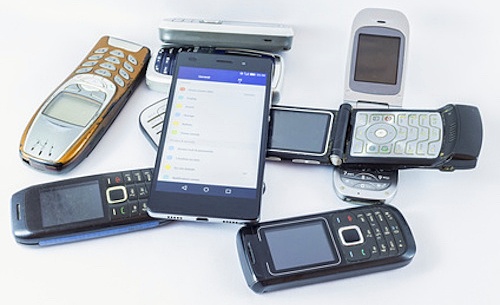
Is Your Business a “Service” or a “Brand”?4 min read
Do you remember the early cell phones?
The first one was made available to the public in 1984 (the year I started my business). It weighed an unimaginable 1.75 pounds and earned the nickname “The Brick.” It cost $4,000 and had a battery life of only 30 minutes!
But do you recall the brand of this cell phone?
Almost nobody does because when a new product enters the market, branding isn’t important. Instead, the new product is compared to what came before – in this case the “wired telephone.”
And all the selling points of this new product were about the advantages of the new technology.
But this doesn’t last very long. New products in the same category enter the marketplace with new and improved features and performance.
That’s when the marketing shifts from being marketed as a new “Product” to being marketed as a new “Brand.”
New cell phones were no longer compared to wired phones, but to other cell phones. And what was emphasized were all the new features of that cell phone.
Then, of course, with the iPhone, cell phones became “smart phones,” a whole new category with new branding opportunities.
In 33 years we’ve gone a long way from “The Brick” to Apple’s “iPhone 10.” And it’s hard to avoid the massive marketing of this device and comparisons it to its closest competitor, the Samsung “Galaxy S9.”
What’s true for products is also true for professional services.
We’re all familiar with legal, architectural, accounting, medical, and engineering services.
Once upon a time (in most cases, hundreds of years ago), these services were new and were touted as something truly different.
But as time marched on, these services became differentiated through specialization. Now, for each of these professional services, there are an endless number of specialties.
For instance, I go to a dentist who practices “general dentistry,” but if I need a root canal, a tooth extraction, or dentures, I’ll be referred to a specialist in that field.
But what about professional coaching services?
Personal and professional coaching has been around for about 30 years as well.
At one point, coaching was new and most people had few reference points as to what it actually was. It wasn’t therapy and it wasn’t training. It was kind of like an “individualized growth program designed to help people accomplish more in various areas of their lives.”
And over the years, coaching has diverged into an endless number of specialties. You can find a coach for just about anything, from success achievement, to marketing professional services. (Sound familiar?)
One of the ways you differentiate a professional service such as coaching is by the clients you work with and the results you help them accomplish.
But as a profession matures, that is no longer enough.
Sure, consumers want to know whom you work with and how you can help them. But how do they choose between professional coaches who seem to offer almost identical services?
It’s not just the service you offer, the clients you work with and the problems you solve. After a while, that becomes too generic to even matter.
You can’t be generic anymore; you need to be a brand.
Clients are no longer looking for just a coach, they are looking for a coach who stands apart from every other coach.
So, how do you differentiate yourself as a coach (or any other independent professional)?
By your depth of knowledge. Through writing, speaking, blogging and social media you position yourself as trustworthy and more authoritative than the average professional.
By your personal style and approach. Through the look and feel of your website, videos, webinars, etc., you build a know-like-trust factor.
By proprietary methodologies. When you have a different and more effective way of getting results, you stand apart from all of those using older methodologies.
By what others say about you. Good, in-depth testimonials and case studies prove that you not only produce great results for your clients but are also wonderful to work with.
The overall clarity of your message. It’s not just what you say, it’s how you say it. Your message needs to elicit this response: “He/she is speaking directly to me; they understand me and can help me.”
All this and more becomes your “personal brand.”
If you’re going to succeed as a professional coach or independent professional these days, your personal brand must stand out in a way that is memorable, or you’ll become as irrelevant as the wired telephone.
Cheers, Robert
THE MORE CLIENTS CLUB
If you want to become a more successful marketer of your professional services, Action Plan Marketing provides a comprehensive resource called the More Clients Club.
The Club is a collection of online marketing courses and tutorials, expert interviews, and resources – with hands-on, step-by-step strategies and guidance on how to attract more of your ideal clients.
And access to all of this is only $9 per month...
for $1 Zillion worth of material!








Thank you Robert. So many articles floating around out there about “branding” – but you have clearly explained WHY independent professionals need to do this. Customers can’t read our minds; they need to have a decent idea of what makes one person or company’s approach different from any other entity offering (apparently) similar services.